A lecture given by
His Divine Grace A.C. Bhaktivedanta Swami Prabhupada
on Vyasa-puja day, 1973, at Bhaktivedanta Manor, England
om ajnana-timirandhasya
jnananjana-salakaya
caksur unmilitam yena
tasmai sri-gurave namah
“I was born in the darkest ignorance, and my guru, my spiritual master, opened my eyes with the torch of knowledge. I offer my respectful obeisances unto him.”
The word ajnana means ignorance or darkness. If all the lights in this room immediately went out, we would not be able to tell where we or others are sitting. Everything would become confused. Similarly, we are all in darkness in this material world, which is a world of tamas. Tamas or timira means darkness. This material world is dark, and therefore it needs sunlight or moonlight for illumination. However, there is another world, a spiritual world, that is beyond this darkness. That world is described by Sri Krishna in Bhagavad-gita:
na tad bhasayate suryo
na sasanko na pavakah
yad gatva na nivartante
tad dhama paramam mama
“That abode of Mine is not illumined by the sun or moon, nor by electricity. One who reaches it never returns to this material world.” (Bg. 15.6)
From Darkness to Light
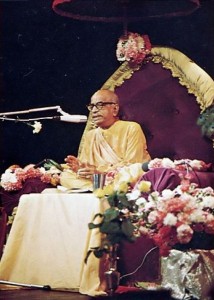
The guru’s business is to bring his disciples from darkness to light. At present everyone is suffering due to ignorance, just as one contacts a disease out of ignorance. If one does not know hygienic principles, he will not know what will contaminate him. Therefore due to ignorance there is infection, and we suffer from disease. A criminal may say, “I did not know the law,” but he will not be excused if he commits a crime. Ignorance is no excuse. Similarly, a child, not knowing that fire will burn, will touch the fire. The fire does not think, “This is a child, and he does not know I will burn.” No, there is no excuse. Just as there are state laws, there are also stringent laws of nature, and these laws will act despite our ignorance of them. If we do something wrong out of ignorance, we must suffer. This is the law. Whether the law is a state law or a law of nature, we risk suffering if we break it.
The guru’s business is to see that no human being suffers in this material world. No one can claim that he is not suffering. That is not possible. In this material world, there are three kinds of suffering: adhyatmika, adhibhautika and adhidaivika. These are miseries arising from the material body and mind, from other living entities and from the forces of nature. We may suffer mental anguish, or we may suffer from other living entities—from ants or mosquitoes or flies—or we may suffer due to some superior power. There may be no rain or there may be flood. There may be excessive heat or excessive cold. So many types of suffering are imposed by nature. Thus there are three types of miseries within the material world, and everyone is suffering from one, two or three of them. No one can say that he is completely free from suffering.
We may then ask why the living entity is suffering. The answer is: out of ignorance. He does not think, “I am committing mistakes and am leading a sinful life; that is why I am suffering.” Therefore the guru’s first business is to rescue his disciple from this ignorance. We send our children to school to save them from suffering. If our children do not receive an education, we fear that they will suffer in the future. The guru sees that suffering is due to ignorance, which is compared to darkness. How can one in darkness be saved? By light. The guru takes the torchlight of knowledge and presents it before the living entity enveloped in darkness. That knowledge relieves him from the sufferings of the darkness of ignorance.
Guru is One
One may ask whether the guru is absolutely necessary. The Vedas inform us that he is:
tad-vijnanartham sa gurum evabhigacchet
samit-panih srotriyam brahma-nistham
(Mundaka Up. 1.2.12)
The Vedas enjoin us to seek out a guru; actually, they say to seek out the guru, not just a guru. The guru is one because he comes in disciplic succession. What Vyasadeva and Krishna taught 5,000 years ago is also being taught now. There is no difference between the two instructions. Although hundreds and thousands of acaryas have come and gone, the message is one. The real guru cannot be two because the real guru does not speak differently from his predecessors. Some spiritual teachers say, “In my opinion you should do this,” but this is not a guru. Such so-called gurus are simply rascals. The genuine guru has only one opinion, and that is the opinion expressed by Krishna, Vyasadeva, Narada, Arjuna, Sri Caitanya Mahaprabhu and the Gosvamis. Five thousand years ago Lord Sri Krishna spoke Bhagavad-gita, and Vyasadeva recorded it. Srila Vyasadeva did not say, “This is my opinion.” Rather, he wrote, sri bhagavan uvaca, that is, “The Supreme Personality of Godhead says.” Whatever Vyasadeva wrote was originally spoken by the Supreme Personality of Godhead. Srila Vyasadeva did not give his own opinion.
Consequently, Srila Vyasadeva is a guru. He does not misinterpret the words of Krishna but transmits them exactly as they were spoken. If we send a telegram, the person who delivers the telegram does not have to correct it, edit it or add to it. He simply presents it. That is the guru’s business. The guru may be this person or that, but the message is the same; therefore it is said that guru is one.
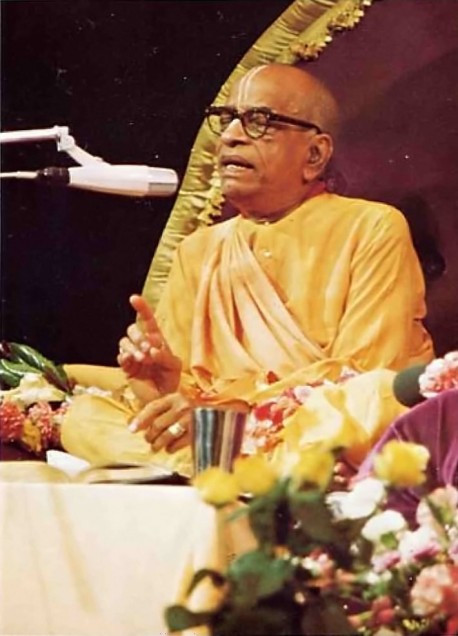
In the disciplic succession we simply find repetition of the same subject. In Bhagavad-gita Sri Krishna says:
man-mana bhava mad-bhakto
mad-yaji mam namaskuru
mam evaisyasi yuktvaivam
atmanam mat-parayanah
“Engage your mind always in thinking of Me, become My devotee, offer obeisances and worship Me. Being completely absorbed in Me, surely you will come to Me.” (Bg. 9.34) These very instructions were reiterated by all the acaryas—Ramanujacarya, Madhvacarya and Caitanya Mahaprabhu. The six Gosvamis also transmitted the same message, and we are simply following in their footsteps. There is no difference. We do not interpret the words of Krishna by saying, “In my opinion, the Battlefield of Kuruksetra represents the human body.” Such interpretations are set forth by rascals. In the world there are many rascal gurus who give their own opinion, but we can challenge any rascal. A rascal guru may say, “I am God,” or, “We are all God.” That is all right, but we should find out from the dictionary what the meaning of God is. Generally, a dictionary will tell us that the word God indicates the Supreme Being. Thus we may ask such a guru, “Are you the Supreme Being?” If he cannot understand this, then we should give the meaning of supreme. Any dictionary will inform us that supreme means “the greatest authority.” We may then ask, “Are you the greatest authority?” Such a rascal guru, even though proclaiming himself to be God, cannot answer such a question. God is the Supreme Being and the highest authority. No one is equal to Him or greater than Him. Yet there are many guru Gods, many rascals who claim to be the Supreme. Such rascals cannot help us escape the darkness of material existence. They cannot illumine our darkness with the torchlight of spiritual knowledge.
The bona fide guru will simply present what the supreme guru, God, says in bona fide scripture. A guru cannot change the message of the disciplic succession. Once there was a gentleman named Vallabhacarya, who was very devoted to Caitanya Mahaprabhu. Vallabhacarya wrote a commentary on Srimad-Bhagavatam, and he presented it to Caitanya Mahaprabhu, saying, “Lord Caitanya, please hear my commentary on Srimad-Bhagavatam. You will find that it is far better than Sridhara Svami’s.” Sridhara Svami was a very ancient commentator Caitanya Mahaprabhu immediately rejected Vallabhacarya, saying, “Oh, are you claiming that you have written something better than Sridhara Svami?” Caitanya Mahaprabhu then chastised Vallabhacarya, saying, svamike yini na manena, tini vesya. Sri Caitanya Mahaprabhu sarcastically used the word svami, which also means husband. He said, “I think that one who does not recognize the svami [husband] is a prostitute.” In other words, “If you do not recognize Sridhara Svami, then you are a prostitute. How can I hear from a prostitute?”
No Research Necessary
We must understand that we cannot carry out research to find the Absolute Truth. Caitanya Mahaprabhu Himself said, “My Guru Maharaja considered me a great fool.” He who remains a great fool before his guru is a guru himself. However, if one says, “I am so advanced that I can speak better than my guru,” he is simply a rascal. In Bhagavad-gita Sri Krishna says:
evam parampara-praptam
imam rajarsayo viduh
sa kaleneha mahata
yogo nastah parantapa
“This supreme science was thus received through the chain of disciplic succession, and the saintly kings understood it in that way. But in course of time the succession was broken, and therefore the science as it is appears to be lost.” (Bg. 4.2)
Taking on a guru is not simply a fashion. One who is serious about understanding spiritual life requires a guru. A guru is a question of necessity, for one must be very serious to understand spiritual life, God, proper action and one’s relationship with God. When we are very serious about understanding these subjects, we need a guru. We shouldn’t go to a guru simply because a guru may be fashionable at the moment. Surrender must be there, for without surrender we cannot learn anything. If we go to a guru simply to challenge him, we will learn nothing. But we must accept the guru just as Arjuna accepted his guru, Sri Krishna Himself:
karpanya-dosopahata svabhavah
prcchami tvam dharma-sammudha-cetah
yac chreyah syan niscitam bruhi tan me
sisyas te ‘ham sadhi mam tvam prapannam
“Now I am confused about my duty and have lost all composure because of weakness. In this condition I am asking You to tell me clearly what is best for me. Now I am Your disciple and a soul surrendered unto You. Please instruct me.” (Bg. 2.7)
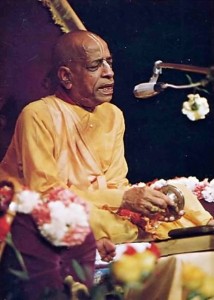
From “God” to Dog
This is the process for accepting a guru. The guru is Krishna’s representative, the former acaryas’ representative. Krishna says that all acaryas are His representatives; therefore the guru should be offered the same respect one would offer to God. As Visvanatha Cakravarti Thakura says in his prayers to the spiritual master: yasya prasadad bhagavat-prasadah. “By the mercy of the spiritual master, one receives the benediction of Krishna.” Thus, if we surrender to the bona fide guru, we surrender to God. God accepts our surrender to the guru.
In Bhagavad-gita, Krishna instructs:
sarva-dharman parityajya
mam ekam saranam vraja
aham tvam sarva-papebhyo
moksayisyami ma sucah
“Abandon all varieties of religion and just surrender unto Me. I shall deliver you from all sinful reaction. Do not fear.” (Bg. 18.66) Someone may argue, “Where is Krishna? I shall surrender to Him.” But no, the process is that we first surrender to Krishna’s representative; then we surrender to Krishna. Therefore it is said, saksad-dharitvena samasta-sastraih: the guru is as good as God. When we offer respects to the guru, we are offering respects to God. Because we are trying to be God conscious, it is required that we learn how to offer respects to God through God’s representative. In all the sastras, the guru is described to be as good as God, but the guru never says, “I am God.” The disciple’s duty is to offer respect to the guru just as he offers respect to God, but the guru never thinks, “My disciples are offering me the same respect they offer to God; therefore I have become God.” As soon as he thinks like this, he becomes a dog instead of God. Therefore Visvanatha Cakravarti says, kintu prabhor yah priya eva tasya. Because he is the most confidential servitor of God, the guru is offered the same respect that we offer God. God is always God, guru is always guru. As a matter of etiquette, God is the worshipable God, and guru is the, worshiper God (seva-bhagavan). Therefore the guru is addressed as prabhupada. The word prabhu means “lord,” and pada means “position.” Thus prabhupada means “he who has taken the position of the Lord.” This is the same as saksad-dharitvena samasta-sastraih.
Only if we are very serious about understanding the science of God is a guru required. We should not try to keep a guru as a matter of fashion. One who has accepted a guru speaks intelligently. He never speaks nonsense. That is the sign of having accepted a bona fide guru. We should certainly offer all respect to the spiritual master, but we should also remember how to carry out his orders. In Bhagavad-gita Sri Krishna Himself tells us the method of seeking out and approaching the guru:
tad viddhi pranipatena
pariprasnena sevaya
upadeksyanti te jnanam
jnaninas tattva-darsinah
“Just try to learn the truth by approaching a spiritual master. Inquire from him submissively and render service unto him. The self-realized soul can impart knowledge unto you because he has seen the truth.” (Bg. 4.34) The first process is that of surrender. We have to find an exalted person and willingly surrender before him. The sastras enjoin that before we take a guru we study him carefully to find out whether we can surrender to him. We should not accept a guru suddenly out of fanaticism. That is very dangerous. The guru should also study the person who wants to become a disciple to see if he is fit. That is the way a relationship is established between the guru and disciple. Everything is provided, but we must take up the process seriously. Then we can be trained to become a bona fide disciple. First we must find a bona fide guru, establish our relationship with him and act accordingly. Then our life will be successful, for the guru can enlighten the sincere disciple who is in darkness.
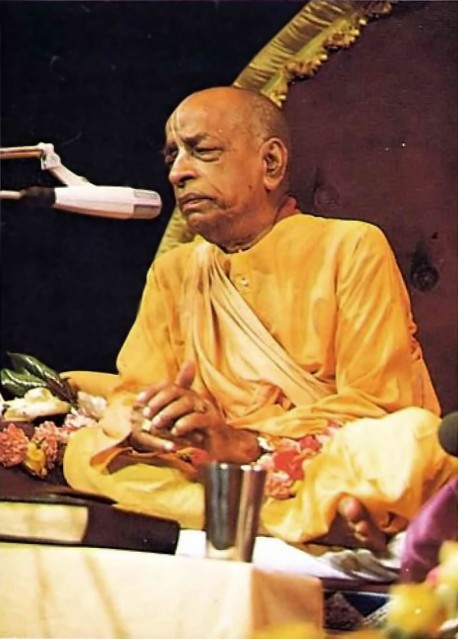
Perfecting Our Life
Everyone is born a rascal and a fool. If we are born learned, why do we need to go to school? If we do not cultivate knowledge, we are no better than animals. An animal may say that there is no need of books and that he has become a guru, but how can anyone obtain knowledge without the study of authoritative books on science and philosophy? Rascal gurus try to avoid these things. We must understand that we are all born rascals and fools and that we have to be enlightened. We have to receive knowledge to make our lives perfect. If we do not perfect our lives, we are defeated. What is this defeat? The struggle for existence. We are trying to obtain a better life, to attain a superior position, and for this we are struggling very hard. But we do not know what a superior position actually is.
Whatever position we have in this material world must be given up. We may have a good position or a bad position; in any case, we cannot remain here. We may earn millions of dollars and think, “Now I am in a good position,” but a little dysentery or cholera will finish our position. If the bank fails, our position is gone. So actually there is no good position in this material world. It is a farce. Those who try to attain a better position in the material world are ultimately defeated because there is no better position. Bhagavad-gita (14.26) says what the better position is:
mam ca yo ‘vyabhicarena
bhakti-yogena sevate
sa gunan samatityaitan
brahma-bhuyaya kalpate
“One who engages in full devotional service, who does not fall down in any circumstance, at once transcends the modes of material nature and thus comes to the level of Brahman.”
Is there any science that gives us the knowledge by which we may become immortal? Yes, we may become immortal, but not in the material sense. We cannot receive this knowledge in so-called universities. However, there is knowledge contained in the Vedic scriptures by which we may become immortal. That immortality is our better position. No more birth, no more death, no more old age, no more disease. Thus the guru takes on a very great responsibility. He must guide his disciple and enable him to become an eligible candidate for the perfect position, immortality. The guru must be competent to lead his disciple back home, back to Godhead. Thank you very much.

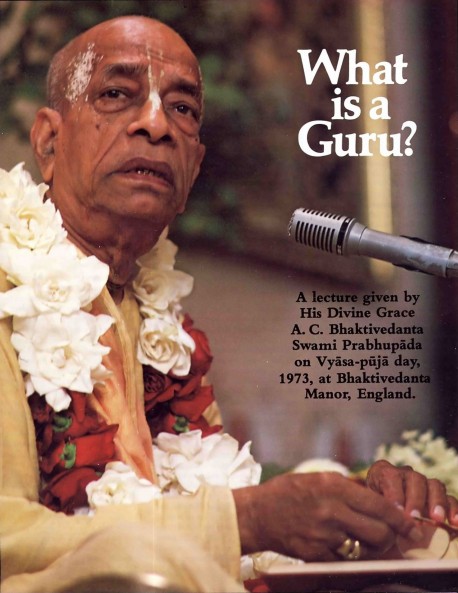
Leave a Reply